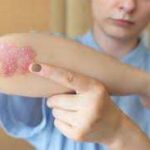The skin is often considered to reflect the internal health and well-being of the body. Any unusual change can be an indication that there is something not right inside the body. This is why it is important to maintain skin health and treat diseases through a holistic approach that considers not just the symptoms on the surface, but also the underlying cause. Today, we will learn about some ways through which treating fungal infections become possible.
Fungal infections are one of the most common types of infections in the world. If left untreated, it may spread from one infected person to another or from one body part to the other. Fungal infections are commonly caused due to the growth and spread of certain fungi on body tissues.
What Is a Fungal Infection?
Fungal infection, also known as Mycosis, is an inflammatory condition that is caused by an overgrowth of fungal microorganisms. Fungal infections not only affect the skin but can also weaken the immune system. In severe cases, fungal infections can also cause more serious complications, such as skin damage, hair loss, and nail deformities.
Fungal infections can be triggered by factors such as a weakened immune system, increased humidity and heat, and poor hygiene. As per Ayurveda, fungal infections occur due to an imbalance in the body’s natural defences, particularly the disturbance in the “tridoshas”, the three fundamental energies that govern the body.
Sign and Symptoms of Fungal Infections
Symptoms vary from person to person and the type of fungi involves. Common signs to look out for are:
- Skin changes like peeling or cracking
- Blisters
- Itching along with a burning sensation
- Swelling
- Scaly skin
- Irritation and redness

Treatment for Fungal Infections:
Treatments for fungal infections, as per Ayurveda, typically aim to restore balance to the affected area and the body as a whole. The treatments of fungal infections may involve the use of herbs and natural remedies to support the immune system, in addition to dietary and lifestyle changes to reduce the risk of recurrence.
Topical treatments, such as herbal pastes or oils, can also be applied to the affected area to help clear the infection and promote healing. The specific approach to treatment will depend on the severity of their condition.
Here are some effective treatment options for treating fungal infections:
01. Herbal remedies: Herbs like neem, and tea tree oil can be recommended for healing. These herbs have natural antifungal and antimicrobial properties that can help boost the immune system and reduce inflammation.
02. Dietary changes: Diet plays a crucial role in maintaining skin health and preventing fungal infections. It is recommended to avoid sugary, starchy, and fermented food, and to increase the consumption of fresh fruits, green vegetables, nuts, and whole grains.

03. Lifestyle modifications: Maintaining good hygiene, such as regular washing, keeping the skin dry, and wearing breathable clothing, is crucial in treating fungal infections. In addition, regular exercise, relaxation techniques, and getting adequate rest are also important in recovery.
Benefits of treating fungal infections with Ayurveda include:
-The use of natural remedies reduces the risk of side effects or interaction with other medications.
-The holistic approach to treatment, which considers not just the symptoms, but also the underlying causes of the infection.
-The focus on maintaining good health and balance in the body, which can help to boost the immune system.
Conclusion
By incorporating dietary changes, lifestyle modifications, and herbal remedies, it is possible to treat fungal infections and promote healthy skin, scalp, and nails. If you have any concerns about fungal infections, feel free to reach out to Ayursparsh Clinic and Panchakarma Center, the best clinic for fungal infection treatment in Dharwad, India.
Make sure to consult with our specialist, Dr. Rashmi C. Patil, a leading Ayurvedician, to determine the best course of treatment for fungal infections.




